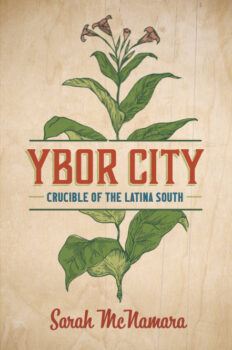History Professor Receives National Book Award For Piece On Women And Labor

Dr. Sarah McNamara, an assistant professor in the Department of History at Texas A&M University, has received the Sara A. Whaley Book Prize from the National Women’s Studies Association (NWSA) for her first book, Ybor City: Crucible of the Latina South, published by the University of North Carolina Press in April 2023.
“As a historian, I focus on histories of Latinas/os, immigration, labor, and women and gender from the late 19th through the 20th centuries and into the present,” McNamara said.
McNamara earned her Ph.D. from the University of North Carolina at Chapel Hill in 2016 and received training from the Southern Oral History Program that she says helped shaped her approach to historical methodology and community engagement.
“My methods range from oral history to traditional archival work to material culture interpretation,” McNamara added. “I am deeply committed to community engagement and fostering relationships with the communities I engage. In some ways, my personal connection to the place about which I research taught me the importance of this principle.”

Since 2008, the Sara A. Whaley Book Prize has been awarded annually for a monograph that addresses women and labor from intersectional perspectives. The prize honors Sara Whaley, the former owner of Rush Publishing and an editor of Women’s Studies Abstracts. McNamara received a $2,000 award and was honored at the NWSA 2023 Annual Conference in Baltimore.
The NWSA, established in 1977, seeks to “promote and support the production and dissemination of knowledge about women and gender through teaching, learning, research and service in academic and other settings.” One of the NWSA’s commitments is to “demonstrate the contributions of feminist scholarship that is comparative, global, intersectional and interdisciplinary to understandings of the arts, humanities, social sciences and sciences,” among others.
“When you are writing a book, you do not think about the recognition it may receive,” McNamara said. “As I wrote Ybor City, I wanted to share a history that took the U.S. South seriously and accounted for the multiple experiences people had living, working and surviving in this place.
“Winning the Sara A. Whaley Book Prize is incredibly validating. The award affirms that my years of work — research, writing and re-writing — were all worth it. I’m incredibly proud that people find there is much to learn from this research across disciplines and communities in both scholarly and non-scholarly spaces. I still find the fact that my book won this prize a bit surreal.”
Living History
McNamara’s prize-winning monograph looks at the history of Cuban immigrants in Ybor City, a historic neighborhood northeast of Tampa, Fla. Specifically, McNamara explores three generations of Latinas/os — one immigrant and the others U.S.-born — who worked in Ybor City and Tampa as they advocated for just employment and Cuban independence and organized against fascism and Jim Crow. The book centers on the years between the movement of the Cuban cigar industry from the island to Florida in the 1860s to the rise of urban renewal in the 1960s, examining the role of women’s leadership in their political efforts and the complex beliefs of the community.
As part of her research, McNamara unveiled a historic marker and mural titled “Nuestra Historia” within the City of Tampa in March 2023 in dedication to the May 6, 1937, Ybor City women’s march against fascism.
“At its heart, Ybor City is a history of how people, places and politics become who and what they are,” McNamara said. “My book examines how people’s ideas of themselves and their politics shift over time. The people of Ybor City were broadly working class and carried leftist political principles. By the time of the Cuban Revolution, there were many who supported the Castro Revolution as well as those who continued to support Castro for decades thereafter. This difference is notable, not simply due to that historical moment of the Cold War, but because of the different politics that emerged among different groups of people who have a shared national heritage. Such a lesson is important when it comes to understanding political legacies and identity formation. History doesn’t remain in the past. It is very much alive.”
In addition to being an assistant professor in Texas A&M History, McNamara serves as a core faculty member for the Latina/o and Mexican American Studies program. She has published, lectured and edited various works for journals, conferences and books on topics regarding Latinx, women and gender, immigration, and labor histories in Florida, the U.S. South and the modern United States.
McNamara has been lauded for her role as an educator, receiving a 2023 Texas A&M Association of Former Students Distinguished Achievement Award for Teaching, a 2023 College of Arts and Sciences Early Career Teaching Award and a 2021-22 Montague-Center for Teaching Excellence Scholar Award. She has also received many fellowships and grants for her work, including the Public History Project Grant from the Immigration and Ethnic History Society, the Carlos H. Cantu Research Grant from the Race and Ethnic Studies Institute, the Monroe Research Fellowship from the Tulane Center for the Gulf South, and a National Endowment for the Humanities grant for the “Latino Americans: 500 Years of History” project.
“The research funding opportunities the College of Arts and Sciences provides faculty are outstanding,” McNamara said. “On a practical level, most people do not think about the importance of grants, fellowships and awards, but access to those sources of funding allows scholars to do our work. Texas A&M has an excellent internal funding structure that makes faculty more competitive for national grants. I have yet to have an idea that I haven’t been able to pursue — in or out of the classroom — due to resource access.”





